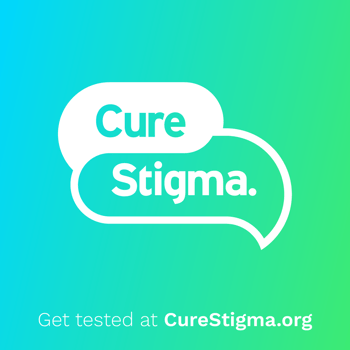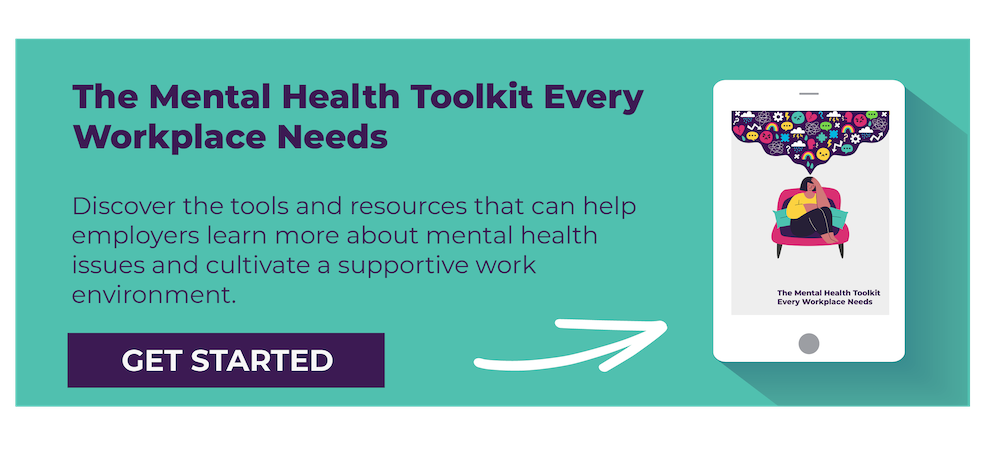 This year, October 7-13 is Mental Illness Awareness Week, giving employers a perfect opportunity to share available resources. The theme this year is "Cure Stigma."
This year, October 7-13 is Mental Illness Awareness Week, giving employers a perfect opportunity to share available resources. The theme this year is "Cure Stigma."
Each year, around 43.8 million Americans experience a mental health condition. Now, more than ever, it’s critical to educate employees about resources to avoid burnout, mental breakdowns, and reduce suicide risk.
Plus, it’s a wise move for businesses to invest in mental health education. A World Health Organization (WHO) study estimated “depression and anxiety disorders cost the global economy US $1 trillion each year in lost productivity.”
Unfortunately, disorders like anxiety and depression often go undetected for months or years. Unlike a physical disability, mental health issues are more challenging to pinpoint, especially for those who aren’t licensed mental health professionals.
Some signs an employee may be struggling:
- Fatigue
- Forgetfulness
- Irritability
- Indecisiveness
- Difficulty concentrating
- Loss of interest in work and/or socializing with coworkers
It’s crucial HR personnel and supervisors receive continuing education to understand how to tactfully and legally handle mental illness discussions. Additionally, learning how to offer reasonable accommodations for employees with psychiatric disabilities sets a tone of acceptance in the workplace.
Arrangements often require minimal investment for the employer, and it usually puts the employee in a better mental state — while cutting down the need for medical and/or disability leave.
Accommodation examples include:
- Breaks - Sometimes greater flexibility may be needed for an individual to take frequent breaks instead of fixed break times.
- Leave time - Mental health days, flexible vacation time, and unpaid or administrative leave for treatment or recovery.
- Flexible work location - Telecommuting or working from home options.
An overwhelmed employee may have a hard time admitting they are dealing with a mental health issue, let alone notify a supervisor or HR director. Once notified, helpful discussions might include mental health resources available and accommodation opportunities for the employee.
While one-on-one employee meetings should never turn into therapy sessions, providing proper resources can retain your qualified employees who feel supported instead of stigmatized.
HR Tip: Keep a list of employees in crisis mode (dealing with a divorce, death, etc.) and periodically check-in with them. Additionally, keep a file with reference sheets of the contact information for local mental health resources available, including counselors accepted by your company’s health insurance.
How to Spread Awareness of Mental Health Issues
If your company is into activism, especially in the mental health field, go big during Mental Illness Awareness Week. Host workshops, execute social media campaigns, and/or hold a fundraiser to donate to mental health organizations. The more the topic is highlighted, the less intimidated employees may feel in reaching out for help.
- Provide free Working Through It training
Set aside a day to offer training for leadership to better understand the impact of mental illness in the workplace. HR can provide handouts and be available for discussion. This training can be modified for group size.
- Host a fundraiser for a local mental health organization
Whether it’s a gala or a car wash, a fundraiser opportunity will get employees talking about mental illness. Have a volunteer committee of employees organize it for the best employee hands-on experience. Donate all proceeds to a local mental health organization.
- Become a StigmaFree Company
Each year, the National Alliance on Mental Illness (NAMI) organizes campaigns to raise awareness to provide support, fight stigma, and educate the public. This year, the theme is “StigmaFree” to help companies develop a culture of acceptance, understanding, and compassion when it comes to mental health. Take the pledge to become a StigmaFree workplace.
HR Tip: Plan ahead and work with your marketing team to expand your reach and potential for positive community outreach opportunities as well.
Create a Healthy Work Environment
Businesses of all sizes have a responsibility to employees to create supportive, safe environments. Aside from the physical workspace, that also includes a mentally healthy space as well. Bullying and harassment, in particular, can have a large impact on the mental health of employees. Studies lead by WHO show negative working environments can lead to mental and physical health issues.
How do you support a healthy work environment?
- Address all mental health problems
- Raise awareness and share resources
- Encourage work-life balance
- Develop mental health policies based on employee feedback
- Offer screening days (Nov. 11 is National Depression Screening Day)
HR Tip: Mental Health America offers free mental health screenings. Share with employees in a newsletter with a note that the screenings are not meant to be an official diagnosis. Do include a list of company insurance resources with the screening link.
Healthy Employees = Healthy Workplace
Healthy employees mean a healthy business. There will always be sales goals, marketing goals, and general company goals to meet. But taking time out to teach your employees about healthy work-life balance and good mental health will ensure those goals can be met while showing their health matters, too.
By bringing attention to mental health, your company normalizes an often taboo topic in an open way. Plus, mentally healthy workplaces foster a strong corporate culture, improved team performance, decreased staff turnovers, fewer absences, and more.
How do you plan to show support during Mental Illness Awareness Week? Share in the comments below!



